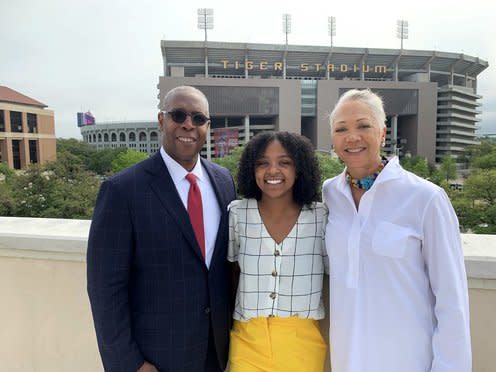LSU Creates Model for Colleges Embroiled in Varsity Blues Scandal

AT&T SEVP & CCO, David Huntley, left, his wife, Tracey Nash-Huntley, right, and LSU student, Staci Shelby, center, at the LSU Foundation next to LSUs Tiger Stadium.
This week, Lori Loughlin (Aunt Becky) and her husband entered a “not guilty” plea in the Varsity Blues case. This followed the U.S. Attorney’s Office in Boston adding money laundering conspiracy to the list of charges she and other defendants face. Sentencing guideline aficionados know that money laundering adds points to the sentencing guidelines range—decreasing the chances of probation at sentencing. Federal courts use these guidelines (which are non-binding) as a basis to form the sentence. A number of other defendants have accepted responsibility and agreed to plead guilty to lesser charges, reducing their guideline points.
News outlets were all over the new charges and the “not guilty” plea. But the better story was over a thousand miles south down on the Bayou, where Louisiana State University (LSU) was working on a different kind of narrative. A few weeks ago, Corporate Counsel published a story challenging schools to examine their admissions controls and compliance programs. On April 12, LSU held the inaugural kickoff for its Ethics Institute. The school began developing the institute in the spring of 2018 well before other universities were mired in the Varsity Blues scandal, but its focus is particularly relevant given the current headlines.
In the shadow of Tiger Stadium, the crowd at the LSU Foundation Center hosting the Institute was a mix of university luminaries and interested alums. Stacia Haynie, Provost, and Troy Blanchard, Associate Dean in the College of Humanities and Social Sciences, kicked off the event and then turned it over to AT&T’s SEVP and Chief Compliance Officer, David Huntley. Most of the groundwork for the Institute has been laid by Dr. Cecil Eubanks, a political science professor and academic legend who has taught at LSU for over 51 years. Many schools teach ethics classes or have some sort of ethics curriculum. But LSU’s idea took this approach further. The school began with this challenge: what if instead of offering ethics classes, you built ethics into the DNA of the school? Every college. Every student. Both Provost Haynie and Dean Blanchard noted that “the goal is to inspire the next generation of ethical leaders.”
Huntley’s speech brought down the house. Huntley talked about how AT&T embedded ethics into AT&T’s business. Huntley has a unique perspective having worked both in AT&T’s business and the legal department. He talked about how AT&T’s program is “built-in” versus “bolt-on.” In other words, Huntley and his team knew the way the business worked and “built the compliance program in.” He gave a number of examples. In creating a mantra for ethical culture, Huntley noted that they landed on “Just Do the Right Thing.” The “just” is there, he noted, because the right thing is in all of us. We can all do it. We just need to make the right choice. Less didactic. More AT&T. He’s a business guy. He gets it. Right on. He talked about how AT&T changed the conversation about ethics and built a culture of “I can help you with that.” The company created simple tools that provide the what and the how. Training that is to the point and relevant.
Jay Martin, longtime Baker Hughes Chief Compliance Officer followed Huntley with a discussion of basic compliance program principles. Our firm has created a tool to assist companies with program design available here, but LSU’s focus goes beyond the program’s framework to focus on the way students make decisions. Guests peppered the speakers with questions (including, humorously, one on Huntley’s socks, which were checkered with AT&T logos and visible from across the room where he was seated). Huntley was joined by his wife, Tracey Nash-Huntley, a distinguished engineer, and longtime family friend and LSU graduating senior (French and Political Science), Staci Shelby, who is headed to Harvard Law School in the fall. When asked about the VW scandal, Huntley noted, “what you permit, you promote”—leadership has to set the right tone and expectations.
After the event, the group toured the campus and saw “Mike the Tiger” in his pen and a number of the new facilities, including a world-class engineering center with virtual reality facilities and a working refinery in the building. We were told that Mike the Tiger is sort of frisky, and the vet school students who feed him have to watch their fingers. Each college had representatives at the event. Longtime prosecutor and jury whisperer (and one of this writer’s mentors), Rene Salomon was on hand from the local U.S. Attorney’s Office, along with law and philosophy professor Raff Donelson to provide the defense perspective.
The LSU Ethics Institute and Huntley really set an example for compliance programs. By embedding compliance into the business culture, the two institutions ensure success. Huntley noted that the compliance program’s job is not only to protect and promote the business, but also to change the way people think about the business (he began his talk by noting a Gallup poll that highlighted distrust in big business). That’s really what LSU is trying to do as well. Change the way students think about the world. Give them the tools to make good decisions. Embed good decision-making in their DNA.
Ryan McConnell is a lawyer at R. McConnell Group—a compliance and investigations boutique law firm in Houston, Texas with Fortune 500 clients across the globe. McConnell is a former assistant U.S. Attorney in Houston who has taught criminal procedure and corporate compliance at the University of Houston Law Center. R. McConnell Group created a Fortune 500 database housed by the University of Houston Law Center and has mapped applicable compliance guidance into a simple framework available on its website that is regularly used by compliance professionals to benchmark their program.


